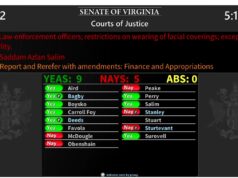From the VA Legislative Black Caucus:
Virginia Legislative Black Caucus Releases Crossover Update on Criminal Justice Reform Agenda
The Virginia Legislative Black Caucus (VLBC) remains in profound solidarity with the 122,500 Virginians who are actively trapped in our state’s criminal justice system, nearly half of whom are Black. When slavery was abolished by the 13th Amendment, it was qualified with “except as a punishment for crime whereof the party shall have been duly convicted.” With that, mass incarceration was born and the criminal justice system absorbed the role of dehumanizing, abusing and punishing Black America.
Defeated Legislation:
The members of this organization are well positioned in both the House and Senate Courts of Justice Committees to block harsher penalties and punitive policies which would increase incarceration rates and sentencing lengths. The harmful, regressive policies we are pleased will not make it into state law include the reestablishment of the death penalty; increased larceny penalties including an automatic felony triggered by the third offense; expansions on the length of probation periods and the removal of limitations on the amount of jail time one can receive for probation violations; the elevation of certain drug offenses to the degree of felony homicide; and the restoration of an automatic denial of bail for certain offenses, denying those arrested the promised presumption of innocence until proven otherwise.
While attempting to roll back the rights of anyone who has or will interact with the criminal justice system, our Republican counterparts are simultaneously working to strengthen the power of the Commonwealth over that of community members. Together, we defeated a list of unnecessary additional reasons for police traffic stops, which we know has historically led to the disproportionate profiling of Black drivers. Additionally, we have protected and affirmed the privacy of criminal history and juvenile justice records because no one deserves to be indefinitely punished for their worst mistake.
Repealing processes which are detrimental to Black communities in Virginia is only half of our task. As quickly as we work to dismantle the unjust criminal system, the VLBC is rebuilding it to be more efficient, empathetic and effective.
Increasing guidance and accountability for law enforcement interventions:
With a joint effort in the House and Senate to restrict the use of the widely condemned and barbaric policy of solitary confinement, SB 719, sponsored by Senator Bagby, and HB 1244, sponsored by Delegate Cole both passed in their respective chambers.
SB 546, sponsored by Senator Bagby, was unanimously passed in the Senate. The bill allows one’s family member or legal guardian to be present during the process to determine whether they meet the criteria for a psychiatric temporary detention order. This act of dignity could have also been life-saving in cases such as that of 28 year old Irvo Otieno, who was killed in custody after being restrained in a Virginia Psychiatric Hospital in 2023.
SB 547, sponsored by Senator Bagby, was unanimously passed in the Senate. This requires law enforcement training for people with Autism Spectrum Disorder.
HB 611, sponsored by Delegate Price, passed with bipartisan support in the House. As we fight to prevent its use, we are championing this bill to increase the reporting on and transparency around deaths in custody. When any person dies under the supposed care of the Commonwealth, we are entitled to a complete investigation, analysis and active measures to prevent another death from occurring in the same way.
HB 1496, sponsored by Delegate Rasoul, passed with bipartisan support in the House. This targets and regulates law-enforcement agencies’ use of surveillance, directing the Department of Criminal Justice Services to create and maintain a registry of surveillance technologies.
Expanding opportunities and pathways out of the criminal justice system:
HB 1269, sponsored by Delegate Price, passed with bipartisan support in the House and was referred to the Senate Committee on Rehabilitation and Social Services. It creates an exemption to certain “barrier crime” rules which block many in the recovery community from employment at an adult substance abuse or mental health treatment program.
SB 482, sponsored by Senator Aird, and HB 803, sponsored by Delegate Rasoul support additional record expungement of juvenile court records, for certain offenses which would be considered a felony, if committed by an adult. While the Senate version of the bill failed to pass out of the Senate Courts of Justice Committee, its House counterpart passed and is on its way to the Senate.
HB 457, sponsored by Delegate Callsen, passed in the House. The bill establishes criteria for the mandatory reduction of probation periods including the defendant’s participation in educational activities, maintaining employment, completing a mental health or substance abuse treatment program, and good conduct.
HB 1252, sponsored by Delegate McClure, passed in the House with some bipartisan support. Aligning with our priority of cutting back the recidivism rate and amount of people behind bars who pose no threat to public safety—the bill introduces parole revocation hearing guidelines, reviews of previous technical violations and limits on sentences after one’s parole has been revoked.
In order to break down the wall between our dual justice systems—one which works for the rich and one which does not work, we are focused on eliminating the financial burden of the carceral system:
HB 824, sponsored by Delegate Cousins, passed in the House. The bill holds indigent Virginian’s harmless for potential increases in court-appointed attorney fees. This will mitigate the burden of legal counsel fees for those among us who are the most financially vulnerable while promoting financial incentives for more attorneys to take court appointments, with better quality representation.
SB 514, sponsored by Senator Williams Graves, passed in the Senate. The bill reduces the fee collection period from a maximum of 60 years and minimum of 30, down to 10 years. This ensures that not every sentence is a life sentence.
SB 481, sponsored by Senator Aird, was passed in the Senate Courts of Justice Committee but failed to pass the Senate Finance and Appropriations Committee. The bill would have abolished juvenile fines and fees related to the prosecution of criminal offenses.
HB 246, sponsored by Delegate Jones, passed in the House and has been referred to the Senate Courts of Justice Committee. The bill makes the fines, penalties and other costs associated with criminal and traffic cases more transparent including updates on what the remaining balance is.
HB 614, sponsored by Delegate Price, passed in the House with some bipartisan support This proposed program to create community service work opportunities, which could be participated in during incarceration, in lieu of payment of fines and costs, is a step towards making criminal consequences more meaningful and restorative for both the incarcerated person and the Commonwealth.
Senator Williams Graves and Delegate Price, have introduced legislation in both chambers to create payment plans and deferred payment agreements for incarcerated people with fees related to their criminal case. SB 654 was passed in the Senate and HB 612 was passed in the House and has been referred to the Senate Courts of Justice Committee.
In the United States, we are leading in imprisonment with a higher rate of incarceration than all other democratic nations. In Virginia, our incarceration rate is even higher than the national average. This is a government failure. Our prisons have created a cycle of abuse, which we must end by reducing unnecessary incarceration:
SB 643, sponsored by Senator Aird, passed out of the Senate Courts of Justice Committee but failed to pass through the Senate. This legislation would create an exemption for willfully failing to appear in judicial proceedings while one is in the custody of law enforcement. Currently, the person in custody would be facing a Class 1 misdemeanor or Class 6 felony even though the ability to appear on time is widely out of their control. For deterrence laws to be effective, they must target those with the power to change the desired outcome.
HB 455, sponsored by Delegate Callsen, passed in the House. This will cut down on unnecessary prison time, due to legal technicalities, by reducing the offense for possession of an item containing less than one gram of a controlled substance from a Class 5 felony to a Class 1 misdemeanor.
HB 179, sponsored by Delegate Gardner, was passed in the House Appropriations Committee but failed to pass through the House. Through eliminating mandatory consecutive sentences of imprisonment, this bill would mitigate needlessly long sentences and allow the court’s approach to any individual to be more holistic.
HB 452, sponsored by Delegate Callsen, passed unanimously in the House. The benefits of the first offender drug program have already been demonstrated in Virginia and we plan to expand them to anyone convicted of an offense related to misdemeanor possession of marijuana. This allows individuals to avoid a conviction or criminal record by satisfying certain probationary terms.
HB 834, sponsored by Delegate Cousins, failed to pass in the House Appropriations Committee. Even if they meet all other criteria, someone who has been transferred out of jail and into state prison cannot petition for the modification of their sentence. By creating a pathway for this, we will simply be elevating them to the same level of due process given to all other citizens.
SB 144, sponsored by Senator Carroll Foy, passed in the Senate. This bill would ensure that those charged with a felony have a right to preliminary hearing—which we are all entitled to under the law. However, prosecutors have exploited a loophole which has rendered this right meaningless on a technicality by dropping charges in District Courts and recharging individuals in Circuit Courts.



![CNU Wason Center Poll of Virginia: Trump Approval at Just 34%; “narrow majority support a constitutional [redistricting] amendment”](https://bluevirginia.us/wp-content/uploads/2026/01/wason0128-1-238x178.jpg)







